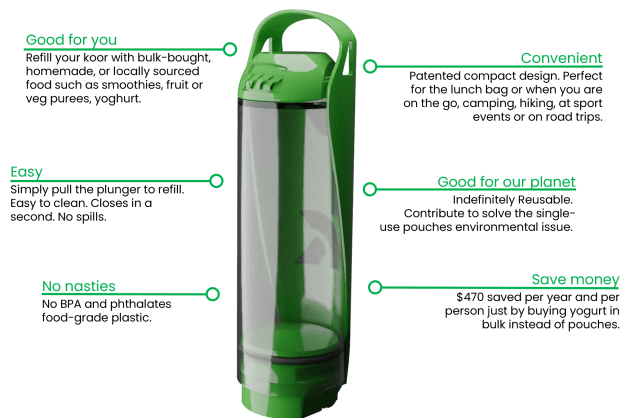In a bid to tackle the growing environmental crisis posed by single-use plastic pouches, a Brisbane-based industrial engineer has developed koor, a reusable container designed to transform the way consumers approach food packaging.
The inventor of koor, Jean-Francois Roiron, says koor was inspired by his daughters’ desire to eat quickly and return to play, and he believes it offers consumers the freedom to enjoy homemade food wherever they are. “Derived from the French word ‘cours’ signifying ‘run’, koor represents the joy of eating on the go while promoting sustainability,” Roiron says.

The product is pitched at on-the-go consumption of foods like yoghurt, sold in spouted pouches. Roiron is determined to make a difference as the global spout pouch market size continues to grow. It reached US $25.2 billion in 2023 and is projected to double by 2032.
The end-of-life plan for koor is as sustainable as its design, according to Roiron, who says the container has been meticulously crafted to be used thousands of times, with easily replaceable parts available at affordable prices. “The plastic components make up to 96 per cent of the product weight and can be recycled, while the remaining silicone O-ring and pad, comprises less than four per cent of the product,” he says.
Made from food-grade PP (polypropylene), koor containers are durable and easy to clean, with replaceable parts to prolong their lifespan. The design prioritises recycling and minimises landfill waste, according to Roiron. Easy to refill by simply pulling the plunger, it closes in a second, making it suitable for the on-the-go lifestyle. Its patented compact design ensures it fits seamlessly into bags or lunchboxes.
Beyond its environmental benefits, koor promotes healthier eating habits and cost-saving.
“Using koor can save money, with yoghurt in large tubs costing three to four times less than in single-use pouches,” said Roiron.

“My daughters said it feels good to stop throwing away all that plastic and I calculated that it saves us about $470 per year per child compared to buying in bulk instead of individual single-use yoghurt pouches from the supermarket.”
The versatility of koor extends beyond its use as a food container. Roiron tells PKN its design allows for a wide range of applications, from storing paints and glues to dispensing hand creams and shampoos. This adaptability, combined with its ease of use and cleaning, positions koor as a multipurpose solution for everyday needs.
In a collaboration with Milton State School’s Year Four technology group, Roiron and the students used the invention for a classroom project to find a real-world solution. A snapshot survey conducted in Milton State School shows 77 per cent of parents expressing interest in swapping food pouches for koor containers.
Roiron’s next step is to develop clean and refill stations in bulk shops and supermarkets to promote collaboration among retailers and producers.
“I encourage any supermarkets and food producers that are serious about reducing packaging to work together,” Roiron says.
The innovation has not yet been commercialised. The first production will be available in August 2024; it can be pre-ordered through koor.life







